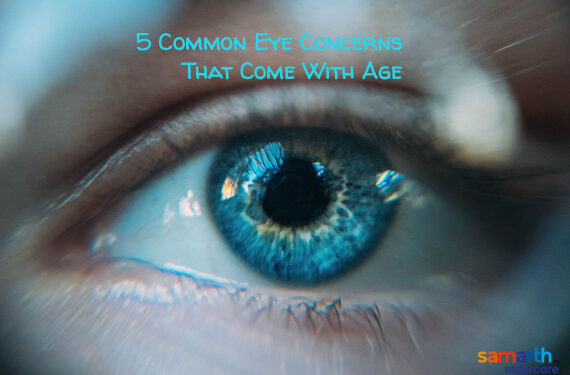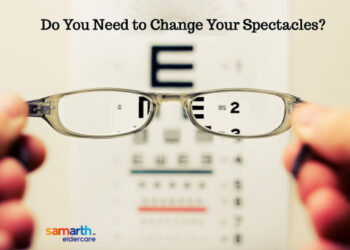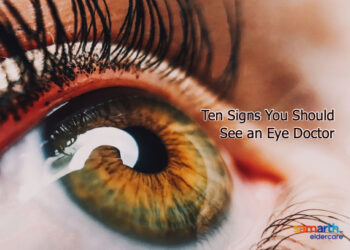It goes without saying that as we age, our vision too takes a hit. As we enter our 50s, many seniors end up needing glasses to correct their vision in some way or the other. Moreover, the amount of time we spend in front of the screens these days only aggravates the issue.
According to a report released by Longitudinal Aging Study in India (LASI), the prevalence of blindness is over six times higher among elderly aged 60 or above than among older adults aged 45-59. Therefore, it is important to understand that your eyes need just as much care as your hearts and lungs, especially as you transition from middle age.

Join Now >
We usually tend to ignore this body part, noticing it only when it starts giving us some trouble. Regular eye tests with a specialist can help detect eye conditions early enough for timely treatment.
Learning about the symptoms and treatments for common eye conditions can help you protect your vision by taking preventive measures in time. To help you get started on your journey towards eye wellness, here is a list of five common eye conditions that you need to watch out for as you age.
Macular Degeneration
Macular Degeneration or MD diminishes sight in a dramatic way: It primarily affects the macula — a tiny portion found at the centre of the retina that is responsible for sharp central vision.
Age is the most significant risk factor for developing the condition. Others include race, family history, high blood pressure and smoking.
Although people with MD rarely go completely blind because of it, many find it difficult to read, drive and perform other daily or detail-oriented functions. In the early stages of the condition, there are usually no clear visual symptoms. A person’s central vision will eventually appear distorted or blurry, however, peripheral vision usually remains intact because the rest of the retina is still healthy.
There is no known cure, but you can lower your risk and possibly slow down the disease’s progression by maintaining a healthy diet, exercising, not smoking, and protecting your eyes from harmful UV rays.
Diabetic Eye Disease
Also known as diabetic retinopathy, diabetic eye disease is a condition found in people with type 1 or 2 diabetes. This occurs when excess glucose damages the blood vessels in the retina, owing to which the blood vessels either bleed or leak fluid.
Symptoms include double or cloudy vision, involuntary eye movements and blurriness. Over time, symptoms may worsen, and you may experience dark spots. If left untreated, it can lead to permanent vision loss too.
There is no cure for diabetic retinopathy. Keeping your blood sugar levels under control is the best way to preserve your sight. In some cases, your doctor might choose to surgically remove the damaged part of the retina, if caught early enough.
Glaucoma
Glaucoma refers to a build-up of pressure within the eye due to the accumulation of fluid. This can damage the optic nerve, resulting in vision loss and blindness.
There are usually no initial symptoms, so it often tends to go undetected until the last stage. However, as the disease progresses, the patient may notice their side or peripheral vision gradually failing. And with no intervention, glaucoma can lead to total blindness.
When treated early, blindness can be prevented. Therefore, regular eye exams are critical and should not be delayed. Your doctor may prescribe you eye drops or pills to treat the condition. And in the specific case, when medication alone cannot be successfully controlled, increased eye pressure and surgery may need to be performed.
Cataracts
People with cataracts often complain about cloudy and fuzzy vision. This happens when the protein component of your eye lens starts to clump together, obscuring the transmission of light through the lens.
People who smoke often, do not protect their eyes from the sun and have a family history of cataracts are more likely to develop the condition. If the cataract worsens and begins to affect vision severely, surgery may be necessary to remove the cloudy lens and replace it with a new one.
Dry Eye Syndrome
As we age, the production of tears in our eyes starts to decline. As a result, older adults over the age of 60 often experience dry eye symptoms, which can cause a burning or stinging sensation in their eyes.
The lack of moisture can lead to a gritty or sandy feeling in the eye, blurred vision and watery eyes due to excessive tearing.
Over-the-counter eye drops provide relief and are usually helpful in mild cases. If symptoms are more severe and persist, you may want to consult your healthcare practitioner or an ophthalmologist for treatment.
Living with healthier eyesight into your golden years is possible if you take proactive steps towards accomplishing this goal from early on. Regular comprehensive eye exams by knowledgeable and caring eye care professionals are crucial to keeping your eyes functioning at their optimum level through the years.









